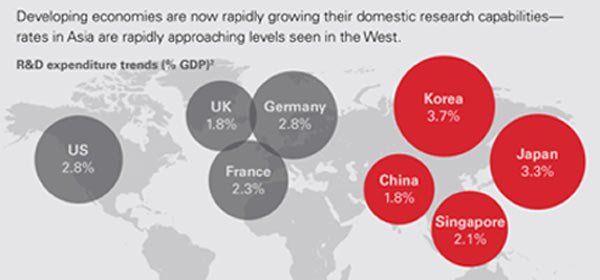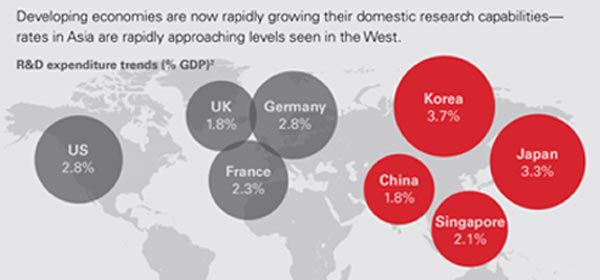UK EXPORT CONFIDENCE AT RECORD HIGH BUT R&D INVESTMENT MUST IMPROVE
Published by Gbaf News
Posted on March 24, 2014
5 min readLast updated: January 22, 2026

Published by Gbaf News
Posted on March 24, 2014
5 min readLast updated: January 22, 2026

Hi-tech spotlight illustrates need for UK to invest in innovation to remain competitive
Emerging markets targeting R&D investment to move up the value chain
Stronger than expected recovery in leading industrialised nations has helped propel UK exporter confidence to a four and a half year high, but Britain must raise its investment in research and development (R&D) if it is to retain its competitiveness in the global economy over the long term, according to HSBC’s latest Trade Forecast.
 The HSBC Trade Forecast shows that trade conditions are improving for UK businesses, with 63% of exporters expecting trade volumes to rise over the next six months, up from 61% during the second half of 2013. UK exports are forecast to increase by 5% per annum over the next two years, driven by the economic recovery in Europe and North America, as well as opportunities in faster-growing markets.
The HSBC Trade Forecast shows that trade conditions are improving for UK businesses, with 63% of exporters expecting trade volumes to rise over the next six months, up from 61% during the second half of 2013. UK exports are forecast to increase by 5% per annum over the next two years, driven by the economic recovery in Europe and North America, as well as opportunities in faster-growing markets.
HSBC’s Trade Confidence Index (TCI) increased by five points from six months ago to reach 113 (any reading above 100 signals anticipated expansion in trade amongst businesses) in the second half of 2013, the highest reading in the survey’s four and a half year history.
However, the UK needs to encourage businesses to investment in R&D to capture more of the value of their merchandise exports, enabling them to move up the value chain over the long term. The latest figures show the UK invests 1.77% of GDP in R&D, a figure that has remained broadly constant over the past 20 years, compared to 2.77% in the US, 2.84% in Germany and 2.25% in France.
It is developing economies that have accelerated investment over the same period. In developing Asia, R&D spend as a percentage of GDP has more than quadrupled to 1.8% and has almost caught up with that of Europe, while China now spends the equivalent of 1.8% of its annual GDP on R&D, a near doubling of its expenditure over the past 20 years.
To illustrate the value chain picture, the latest Trade Forecast focused on the high-tech sector. It found the UK will be outpaced in the growth of technology exports by both developing economies, including China, Malaysia, Indonesia and Turkey, and developed markets such as the US, France and Germany, over the next 15 years.
Improving links between educational institutions and business will be vital in developing the UK’s high-tech sector, as well as encouraging more graduates in STEM subjects (Science, Technology, Engineering and Manufacturing), according to the report.
Mark Emmerson, HSBC UK Head of Global Trade and Receivables Finance, said: “The example of high-tech presents lessons for other sectors and the future pattern of global trade. Companies within developed economies that own the intellectual property of high value goods still enjoy a strong competitive advantage, but under-investment in R&D could threaten the advantage the UK enjoys, presenting an opportunity for emerging markets to gain ground. The world economy is becoming more knowledge-intensive – it is essential for the UK to invest in research and improve links between education and business to retain competitiveness and enhance future growth.”
He added: “The UK’s educational institutions are internationally-acclaimed and Britain performs strongly in terms of the share of the population working in knowledge-intensive industries. However, the UK underperforms compared to trading competitors such as the US in terms of the level of Patent Cooperation Treaty patent applications and R&D investment.”
Trade Growth Forecast
The Trade Forecast expects UK exports to increase to 5% a year between 2016 and 2020, falling to 4% in the decade to 2030. Asia (excluding Japan) is forecast to be fastest growing destination for UK exports of goods over the period, with growth averaging 7% per annum to 2030, with China accounting for a third of the forecast increase in UK merchandise exports to the region.
However the report states UK exporters should remain alert to the opportunities for expanding existing export routes to more traditional trading partners in the West, and it forecasts that the US will move ahead of Germany to become the UK’s largest export partner by 2030.
At the sector level, industrial machinery and transport equipment are expected to be the main drivers of growth, accounting for almost half of the expected increase in the value of UK goods exports in the years to 2030. The same two sectors are also expected to account for more than one
third of the expected increase in goods imports over this period, in part driven by UK firms sourcing intermediate inputs from abroad.
HSBC Commercial Banking
For nearly 150 years we have been where the growth is, connecting customers to opportunities. Today, HSBC Commercial Banking serves businesses ranging from small enterprises to large multinationals in over 60 developed and faster-growing markets around the world. Whether it is working capital, trade finance or payments and cash management solutions, we provide the tools and expertise that businesses need to thrive. With a network covering three quarters of global commerce, we make HSBC the world’s leading international trade and business bank.
For more information see www.hsbc.com/1/2/business-and-commercial
Explore more articles in the Investing category











